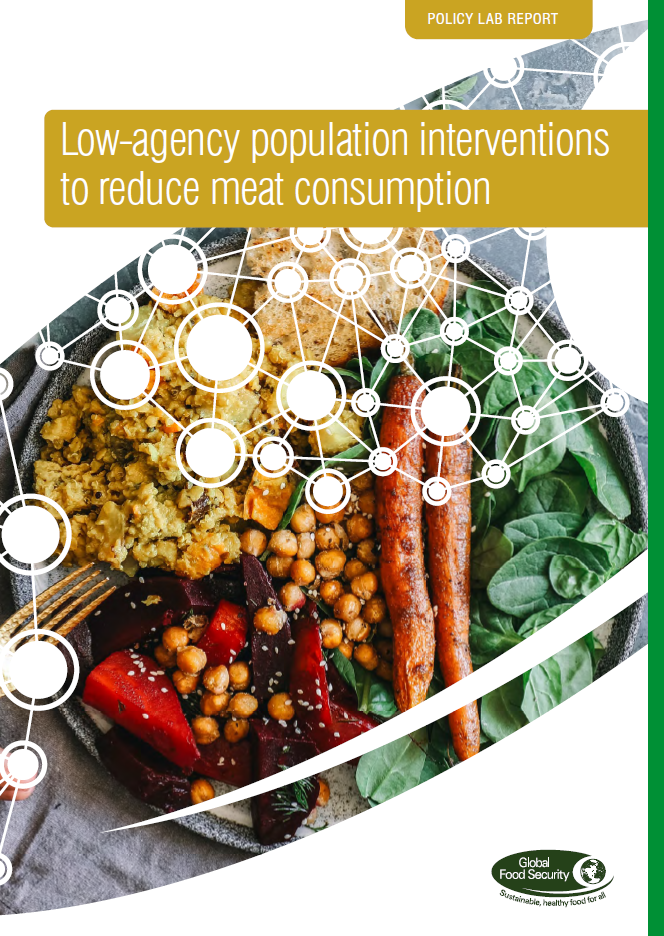Today the Global Food Security programme published its new report ‘Low-Agency Population Interventions to Reduce Meat Consumption’. The report was written by the winners of the 2018 Global Food Security Policy Lab on determinants of food choice for healthy and sustainable diets, and explores the effectiveness of different interventions that could discourage the purchase and consumption of meat.
Despite the rising popularity of plant-based alternatives, diets are becoming increasingly meat-heavy worldwide, with the global demand for meat predicted to grow by 88% between 2010-20501. This has significant implications for public health, as the overconsumption of red and processed meat is linked to increased risks of mortality and several chronic diseases2. Furthermore, meat production is already one of the greatest sources of greenhouse gas emissions and the predominant factor in the loss of global biodiversity3, so reducing meat consumption also offers environmental benefits.
Although many of us might want to reduce our meat consumption4, our behaviour does not always align with our intentions. The effects of marketing, the widespread availability of meat, and the affordability of meat-heavy options, can all undermine our personal attempts to cut back on the amount of meat we eat5. These factors are often so strong that ‘information-based’ campaigns alone are unlikely to be effective in successfully altering long term behaviour changes6. This report explores the value of a range of interventions that require little to no personal or psychological effort, and that aim to discourage high meat diets across the whole population. These strategies are referred to as ‘low-agency population interventions’.
The authors conducted an umbrella review of 44 systematic reviews to critically assess how UK food environments could be re-designed to encourage and guide individuals to eat less meat without limiting personal choice. For example, limiting the size of a portion of meat and reducing the price of meat-alternatives via discounts or subsidies, were both identified as interventions that could be highly effective at reducing meat consumption. “There is growing evidence for effectiveness of these interventions“, said co-leader of the project and author of the report Dr James Reynolds, a research associate at the University of Cambridge; “despite some uncertainties, the scale and urgency of the problem requires taking action” he added.
The report also outlines the implications of actively incorporating such low agency interventions to reduce public meat consumption for UK policy and practice, highlighting the benefit of implementing a suite of changes for maximum effectiveness. Dr. Tarra Penny, Assistant Professor of Global Health at York University, co-leader and author of the report, emphasised that “the implications for policy and practice highlighted the value of combined approaches that do not focus on isolated settings, but rather acknowledge the complex nature of our food systems and eating behaviours.”
The publication was authored by James Reynolds (University of Cambridge), Andrea Scalco (The Rowett Institute, University of Aberdeen), Ourega-Zoé Ejebu (Health Economics Research Unit, University of Aberdeen), Zoi Toumpakari (University of Bristol), Andrea Smith (University College London), Fei Lu (University of Reading), Beth Clark (Newcastle University) and Tarra L Penney (University of Cambridge; York University). The report, ‘Low-Agency Population Interventions to Reduce Meat Consumption’ can be read in full below.

Low-agency population interventions to reduce meat consumption
This report explores how low-agency population interventions can reduce meat consumption across the UK population. It contains an umbrella review of 44 systematic reviews to synthesise all the available evidence for the effectiveness of low-agency population interventions at reducing meat selection, purchase, or consumption. A critical assessment of the evidence is used to discuss the wider insights gained and the implications for policy and practice.
This work was funded by the Global Food Security (GFS) programme as part of its Policy Lab, in which postdoctoral researchers compete to write a policy-facing report for the programme. (You can view PDF documents by downloading a PDF reader. We recommend using Google Chrome or Mozilla Firefox web browsers.)


